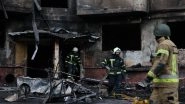Aboard A US Military Aircraft, Feb 4 (AP) The top US commander for the Middle East slipped quietly into Iraq Tuesday, as the Trump administration works to salvage relations with Iraqi leaders and shut down the government's push for an American troop withdrawal.
Marine General Frank McKenzie became the most senior U.S. military official to visit since an American drone strike in Baghdad killed a top Iranian general, enraging the Iraqis.
McKenzie met with Iraq leaders in Baghdad and then went to see American troops at al Asad Air base, which was bombed by Iran last month in retaliation for the drone attack.
His visit comes amid heightened anti-American sentiment that has fuelled violent protests, rocket attacks on the embassy and a vote by the Iraqi parliament pushing for withdrawal of US troops from the country.
And it raises questions about whether the appearance of a high-profile US military commander could spur compromise, or simply inflame tensions and scuttle ongoing negotiations to put Patriot missile batteries in Iraq to better protect coalition forces.
Two reporters traveling with McKenzie for the past two weeks around the Middle East did not go with him into Iraq because the stop was added late and they didn't have required visas.
Top US leaders have so far flatly dismissed Iraqi demands for US troops to leave, adopting what appears to be a wait-and-see attitude with the hope that the problems will pass.
Iraqis, however, were furious over the drone strike at Baghdad's international airport on January 3 that targeted and killed Qassem Suleimani, Iran's most powerful general, but also struck down an Iraq general who was with him.
The Iraqi, Abu Mahdi al-Muhandis, was the deputy commander of Iran-backed militias known as the Popular Mobilization Forces.
In response to what Iraqi leaders called a breach of sovereignty, Parliament passed a non-binding resolution urging US troop withdrawal.
But after Iran struck back on January 8, launching ballistic missiles at two Iraqi bases where American troops were stationed, the US doubled down and asked to bring the Patriot systems into the country.
There were no Patriots or other air defenses in Iraq capable of shooting down ballistic missiles at the time of the Iranian strike. No forces were killed, but at least 64 have been diagnosed with traumatic brain injury.
Thus far, the Iraqis have not approved the request.
“That is one of the matters we have to work on and work through” with the Baghdad government, Defense Secretary Mark Esper told a recent Pentagon news conference.
He and Army Gen. Mark Milley, chairman of the Joint Chiefs of Staff, have made clear that they want Patriots in Iraq to better protect service members there.
The United States has more than 6,000 troops in Iraq to train and advise Iraqi security forces in their fight against extremist groups like the Islamic State and to provide protection for those troops. (AP)
(The above story is verified and authored by Press Trust of India (PTI) staff. PTI, India’s premier news agency, employs more than 400 journalists and 500 stringers to cover almost every district and small town in India.. The views appearing in the above post do not reflect the opinions of LatestLY)













 Quickly
Quickly


